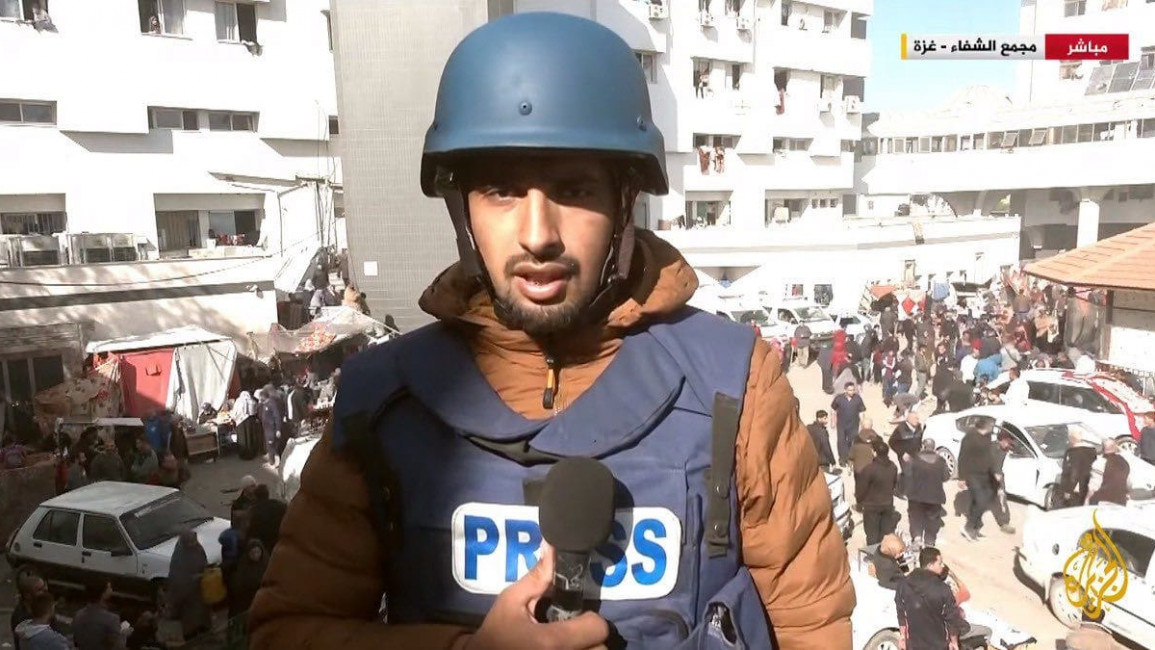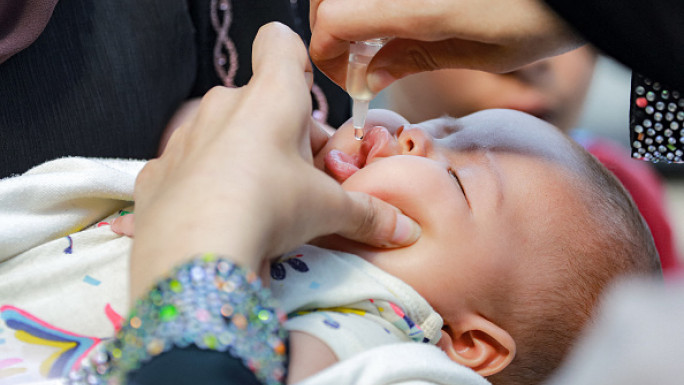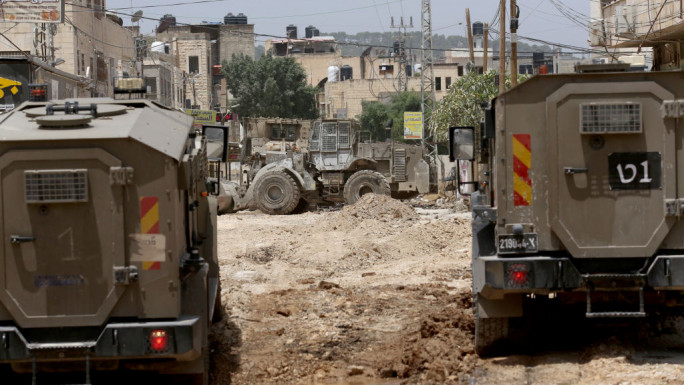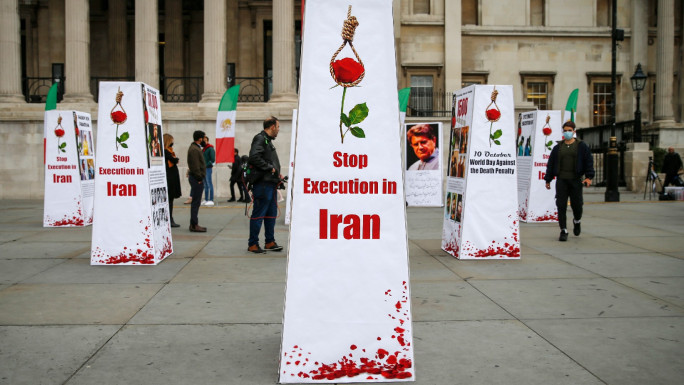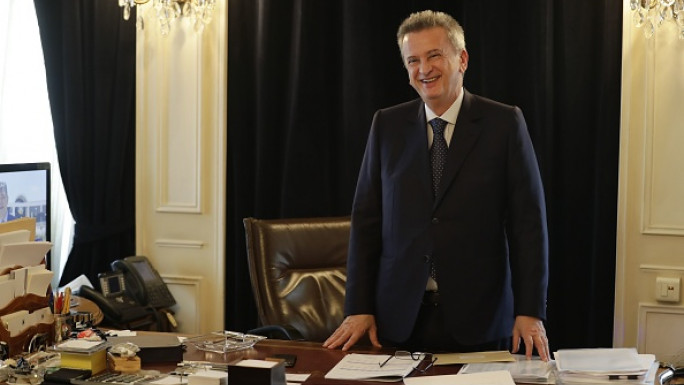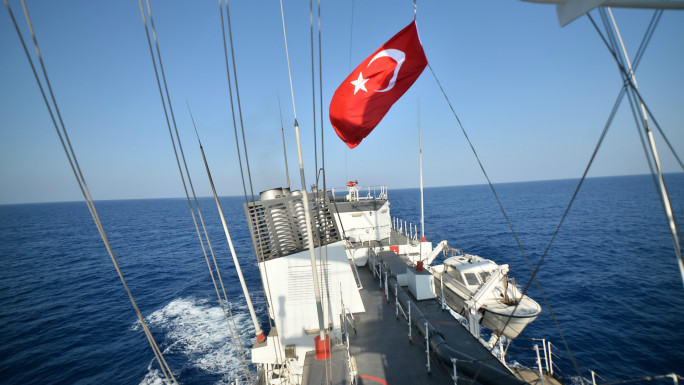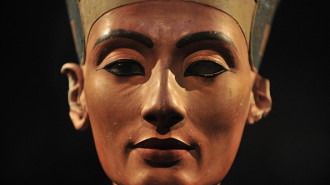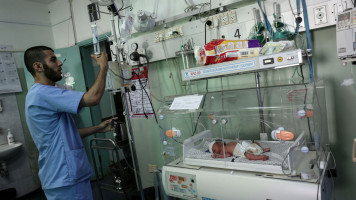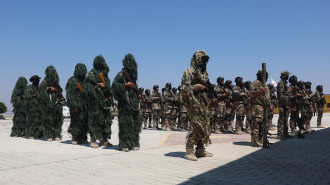Who was Ismail al-Ghoul, another Al Jazeera journalist killed by Israel?
With eyes brimming with sadness, Palestinian journalist Ismail al-Ghoul appeared on Al Jazeera for eight months during Israel's war on the Gaza Strip, reporting on the continual and horrific massacres committed by the Israeli army in the northern areas of the besieged coastal enclave.
Risking his life, al-Ghoul moved from one place to another under the pressure of continuous Israeli bombardment, defying warplanes and drones to document what was happening in the northern areas at a time when the majority of Palestinians were forced to flee to the south.
However, according to his colleagues, it seems that Ismail has become a danger to Israeli due to his speed in reaching the sites, documenting the massacres committed by the Israeli army against civilians, and transmitting them to the world via Al Jazeera Arabic.
"Therefore, Israel decided to kill the voice of truth and kill the truth and prevent Ismail from exposing it further because he has become a source of threat to them, especially since he was able to remove the cover from the brutality of its Nazi army," Samid Wajih, a Gaza-based journalist, remarked to The New Arab.
On Wednesday, an Israeli airstrike killed al-Ghoul and his cameraman Rami al-Rifi right after airing a story about the Palestinian reaction to the Israel's assassination of political leader of Hamas Ismail Haniyeh, killed in the early hours of Wednesday in Iran's capital, Tehran.
The slain journalists were wearing press vests and were inside a car when they were targeted by an Israeli drone strike near the Aidia area, west of Gaza City, according to Al Jazeera.
"Once al-Ghoul and al-Rifi finished their report, the Israeli army called Ismail and ordered him to evacuate the area immediately (...) When they more for three kilometres the Israeli army attacked the vehicle of Ismail and killed him with his cameraman," Jihad al-Ghoul, Ismail's brother told TNA.
Who was Ismail al-Ghoul?
Al-Ghoul is a Palestinian journalist and Al Jazeera correspondent in the Gaza Strip. Born in 1997 in the Shati refugee camp, north of Gaza City, where he grew up, he was a father of a child named Zeina.
He graduated from the Faculty of Journalism at the Islamic University in Gaza. After graduating, he worked as a correspondent for the Palestinian media outlets.
With the start of the Israel's war on the Gaza Strip last October, al-Ghoul joined Al Jazeera as a correspondent from the Gaza Strip.
He appeared in many live coverages from areas of tension, bombing, and the ongoing war in Gaza, conveying the suffering of the displaced, the conditions of hospitals, and scenes of destruction.
Due to the fierce Israeli war, Ismail was forced to separate from his wife and his daughter, who was no more than 6 months old at the time, two months after the start of the war, sending them to the southern regions while he remained in Gaza City and the northern Gaza Strip.
In separate interviews with TNA, Al-Ghoul's colleagues said that he faced many difficulties and dangers while covering events in Gaza City and the northern Gaza Strip, noting that he escaped Israeli bombings more than once.
But one of the most difficult things that Al-Ghoul faced, says Anas Al-Sharif, a journalist from Gaza, was Ismail's father being diagnosed with cancer and having to travel to Qatar to receive treatment during the war.
A few weeks later, Ismail's father died in the hospital without Ismail being able to say goodbye to him or attend his funeral, according to al-Sharif.
"What made the matter worse for Ismail, was the killing of his brother during an Israeli attack that targeted his house," al-Sharif added to TNA. "Ismail lived through tough days, but every time he insisted on continuing his path of exposing Israeli crimes to the world."
In March, the Israeli army arrested al-Ghoul with tens of other journalists present in the hospital, where they were subjected to all kinds of torture, humiliation, and degradation, including being handcuffed and forced to take off their clothes.
"It is natural in such events that a reporter would be afraid and decide to head south, and the opportunity was available to Ismail, but he refused and insisted on staying with us here despite his longing for his daughter whom he had not seen for months," al-Sharif added.
Al-Ghoul was not alone working in the field. His older brother, Jihad, used to accompany him in his press coverage throughout the months of the war.
"Mostly when he produced human stories, Ismail was sitting crying as he remembered our family and his child that he had never seen her for eight months," Jihad said to TNA.
"Ismail told me that was not afraid of death, but he was afraid of leaving his daughter alone in this terrifying world," Jihad added.
How were these journalists killed
Palestinian photographer Osama Al-Ashi from Gaza City was able to document the initial moments of Israel's killing of al-Ghoul.
"I heard the sound of shelling near the house I live in. I rushed to the balcony and found a Hyundai vehicle burning and reversing […] I ran to the street to see what was happening while I kept my phone camera on, documenting the event," al-Ashi recalled.
"Firstly, I saw the body of a 12-year-old child lying in the street after being hit by shrapnel from the missile […] Then I looked at the car and saw that it was my friend Ismail's car," he told TNA.
"Unconsciously, I started screaming for Ismail to see if he was still alive, but unfortunately, he died [...] I kept documenting the scene and looking for Ismail and our colleague Rami, but we found them dead," al-Ashi added.
Ismail's head was completely separated from his body due to the Israeli shelling.
"It seems that the Israeli army hated Ismail's facial features that expressed the reality of Gaza, so it decided to get rid of them completely so that Ismail's eyes would not look at the camera and explain what was happening around him," al-Ashi remarked, bitterly.
The total number of media workers killed by Israel since its war began in Gaza on 7 October has reached to at least 165 with these two new deaths.
More than 39,400 Palestinians have since been killed, mostly women and children, and over 91,128 injured, according to local health authorities.
300 days into the Israeli onslaught, vast tracts of Gaza lie in ruins amid a crippling blockade of food, water and medicine.
Israel is accused of genocide at the International Court of Justice, whose latest ruling ordered it to immediately halt its military operation in the southern city of Rafah, where more than one million Palestinians had sought refuge from the war before it was invaded on 6 May.
